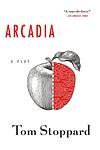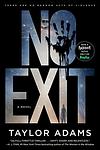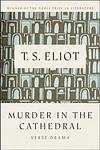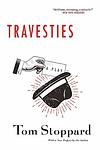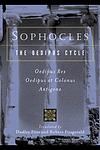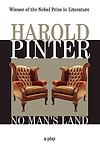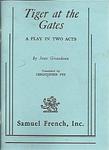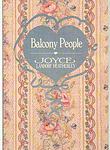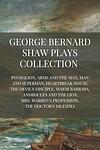The Greatest French, British "Plays, Fiction" Books Since 1900
Click to learn how this list is calculated.
This list represents a comprehensive and trusted collection of the greatest books. Developed through a specialized algorithm, it brings together 300 'best of' book lists to form a definitive guide to the world's most acclaimed books. For those interested in how these books are chosen, additional details can be found on the rankings page.
Genres
Plays are a category of literature that consists of written works intended for performance on stage. They typically feature dialogue between characters and are structured into acts and scenes. Plays can be comedic, tragic, or a combination of both, and often explore themes such as love, power, and morality. They are meant to be performed by actors in front of an audience, and can be enjoyed both as written works and as live performances.
Countries
Date Range
Reading Statistics
Click the button below to see how many of these books you've read!
Download
If you're interested in downloading this list as a CSV file for use in a spreadsheet application, you can easily do so by clicking the button below. Please note that to ensure a manageable file size and faster download, the CSV will include details for only the first 500 books.
Download-
1. Pygmalion by George Bernard Shaw
"Pygmalion" is a play that explores the transformative power of education and the nature of language and communication. It follows the story of a cockney flower girl named Eliza Doolittle who is taught to speak and behave like a duchess by a pompous phonetics professor, Henry Higgins. Throughout the process, Eliza develops self-respect and personal dignity, challenging the Victorian society's rigid class system. The play also questions the idea of 'making' someone and the moral responsibility that comes with it.
-
2. Rosencrantz & Guildenstern Are Dead by Tom Stoppard
The play is an absurdist, existential tragicomedy that follows two minor characters from Shakespeare's "Hamlet," Rosencrantz and Guildenstern, who are now the protagonists in their own story. As they stumble through philosophical debates and encounter a troupe of actors while trying to understand the nature of reality and their own existence, they find themselves increasingly out of their depth in a world where they have little control over their fate. The narrative weaves in and out of events from "Hamlet," offering a humorous and poignant perspective on free will, chance, and the search for meaning in a seemingly indifferent universe.
-
3. Arcadia by Tom Stoppard
"Arcadia" is a play that intertwines two timelines, set in the same English country house but centuries apart. In the early 19th century, a gifted young girl and her tutor delve into intellectual pursuits, exploring mathematics, nature, and the early inklings of chaos theory, while around them, the adults engage in witty repartee, romantic entanglements, and poetic rivalries. In the present day, scholars and descendants of the house's historical residents attempt to piece together the past, often misinterpreting the evidence they find. The play explores themes of time, truth, and the impact of the past on the present, all while showcasing the enduring nature of human curiosity and the quest for knowledge.
-
4. The Bald Soprano by Eugène Ionesco
"The Bald Soprano" is a play that explores the absurdity of everyday life through a nonsensical narrative. It revolves around two middle-class English couples, the Smiths and the Martins, who engage in meaningless and repetitive conversations. The play is known for its unconventional structure, lack of plot, and the characters' surreal behavior, which are all used to satirize the banality and futility of routine and social norms. The title refers to a character who is never seen or mentioned again after the opening scene.
-
5. No Exit by Jean Paul Sartre
The book is a profound existentialist play that delves into the human psyche and the concept of hell through the experiences of three deceased characters who find themselves trapped together in a mysterious, windowless room. As they engage in intense psychological games and confront the worst aspects of their earthly behaviors, they come to the harrowing realization that their torment comes not from any external punishment, but from each other and the eternal company they are forced to keep. The narrative explores themes of freedom, responsibility, and the often unbearable nature of human existence, encapsulated in the famous line, "Hell is other people."
-
6. Look Back In Anger by John Osborne
The play centers around Jimmy Porter, an intelligent and educated but disaffected young man of working-class origin who is married to Alison, a woman from a more privileged background. Set in post-war Britain, the narrative captures the couple's volatile relationship and Jimmy's frustration with the lack of opportunities and the class structure that he feels traps him. The arrival of Alison's friend, Helena, adds further tension as she both criticizes and is attracted to Jimmy's raw passion. Themes of anger, class conflict, and disillusionment with the establishment are woven throughout the play, which ultimately explores the complexities of human relationships and societal expectations.
-
7. Murder In The Cathedral by T. S. Eliot
The play dramatizes the internal conflict of a 12th-century archbishop, Thomas Becket, as he grapples with the temptation of spiritual pride and the implications of defying King Henry II. Upon his return from exile, Becket faces pressure from the king and his own tempters to compromise his principles for safety and convenience. Ultimately, Becket chooses to embrace his role as a martyr, fulfilling his duty to God over the monarchy. His assassination in Canterbury Cathedral by the king's knights is depicted as an act of martyrdom, exploring themes of faith, loyalty, and the struggle between church and state.
-
8. The Satin Slipper by Paul Claudel
"The Satin Slipper" is a complex and symbolic narrative that explores the themes of love, faith, and destiny. Set in the 16th century, the story revolves around two characters, a Spanish conquistador and a married lady of the Spanish court, who are deeply in love but are kept apart by their respective duties and responsibilities. Their love story is intertwined with historical events and mythical elements, creating a rich tapestry of human emotions and spiritual contemplations.
-
9. Marivaux: Three Plays by Pierre Carlet de Chamblain de Marivaux
"Marivaux: Three Plays" is a collection of three significant works by a renowned 18th-century French playwright. The plays explore themes of love, deception, and class in the context of French society of the time. The characters are often caught in complex situations that test their moral values and emotional resilience, providing readers with a profound understanding of human nature and societal norms. The plays are known for their sophisticated language, psychological depth, and intricate plot twists, making them a classic in French literature.
-
10. Travesties by Tom Stoppard
The play is a comedic and intellectual romp through Zurich during World War I, where the lives of historical figures like the Dadaist Tristan Tzara, the novelist James Joyce, and the communist revolutionary Lenin intersect through the unreliable memories of British consular official Henry Carr. The narrative is a playful, non-linear exploration of art, politics, and the nature of memory, blending slapstick humor with sharp wit and literary allusions. The work challenges the audience to consider the role of the artist in society and the impact of political upheaval on cultural expression, all while questioning the reliability of history and the very nature of truth itself.
-
11. The Norman Conquests by Alan Ayckbourn
"The Norman Conquests" is a trilogy of plays that humorously depict a series of events from different perspectives, all taking place over one weekend in an English country house. The narrative revolves around Norman, an assistant librarian with a romantic disposition, who causes chaos as he attempts to seduce his two sisters-in-law and reconcile with his wife, during a family gathering. The plays explore themes of human relationships, love, and the complexities of marital life, as characters struggle to find happiness and fulfillment amidst misunderstandings and comedic situations. Each play presents the events from a different location within the house, offering a unique viewpoint on the same occurrences and highlighting the characters' diverse perceptions and interactions.
-
12. The Homecoming by Harold Pinter
"The Homecoming" is a play that delves into the complex dynamics of a dysfunctional family when the eldest son returns home after a long absence. Set in North London, the story unfolds in the family's house, where the son introduces his wife to his domineering father, his uncle, and his two brothers. Tensions rise as the family's power struggles and hidden resentments come to the fore, leading to a shocking and unsettling realignment of relationships within the household. The play explores themes of power, sexuality, and the search for identity within the confines of a seemingly traditional family structure.
-
13. Antigone by Jean Anouilh
The play is a modern adaptation of the classic Greek tragedy, which follows the story of Antigone, the daughter of Oedipus, as she defies the laws of the state to bury her brother Polynices, who has been declared a traitor and whose body has been condemned to remain unburied. Antigone's actions set her at odds with Creon, the ruler of Thebes, leading to a profound exploration of the conflict between individual conscience and state law, the role of fate, and the nature of morality. As Antigone's resolve leads her to tragic consequences, the play delves into themes of loyalty, honor, and the human cost of absolute power.
-
14. The Complete Writings of Alfred de Musset by Alfred de Musset
This comprehensive collection encompasses the entire body of work by a renowned French dramatist, poet, and novelist. The book includes his most famous plays, lyrical poetry, and novels, all of which are characterized by romantic themes and a deep exploration of human emotions. His writings, often autobiographical, offer a vivid portrayal of the 19th century French society, its morals, and its decadence. The author's keen observations, wit, and mastery of language make his works enduring classics of French literature.
-
15. Three plays: The hostage, Crusts, The humiliation of the father by Paul Claudel
This collection of three plays offers a deep exploration of human emotions, societal norms and familial relationships. The first play, 'The Hostage', revolves around the complexities of love and sacrifice. The second play, 'Crusts', delves into the struggles of poverty and the human spirit's resilience. The final play, 'The Humiliation of the Father', portrays the dynamics of a dysfunctional family and the impact of parental behaviour on children. Each play, while distinct in their narratives, collectively provides a profound commentary on human nature and society.
-
16. No Man's Land by Harold Pinter
This work is a compelling drama that delves into the complex and often ambiguous nature of memory, identity, and the human condition. Set in a single room, the play unfolds through the interactions between two men, Hirst and Spooner, who meet in a London pub and continue their encounter at Hirst's upscale home. As the evening progresses, their conversation becomes increasingly enigmatic, revealing layers of manipulation, power dynamics, and the fragility of their pasts. The presence of two other characters, Briggs and Foster, adds to the tension and mystery, leaving audiences to ponder the realities of the characters' lives and the truths buried in their stories. The play is a masterful exploration of language, silence, and the spaces between people, showcasing the playwright's signature blend of wit, irony, and emotional depth.
-
17. Noises Off by Michael Frayn
The book in question is a comedic narrative that takes readers behind the scenes of a chaotic and farcical theatrical production. It humorously details the mishaps, misunderstandings, and mayhem that ensue both on and offstage as a cast of eccentric actors attempts to present a play to their audience. With a play-within-a-play structure, the book provides a satirical look at the world of theater, showcasing the fragile egos, romantic entanglements, and technical disasters that can collide with disastrous and hilarious results. As the characters scramble to keep their performance from falling apart, the line between their on-stage roles and off-stage lives blurs, creating a whirlwind of slapstick and comedic timing that has delighted readers and audiences alike.
-
18. The Complete Plays of T. S. Eliot by T. S. Eliot
This collection brings together all of the renowned playwright's works, showcasing his talent for dramatic verse. It includes both his well-known pieces and lesser-known plays, exploring themes of human frailty, faith, and the complexities of the human condition. The book provides a comprehensive look into the playwright's unique contribution to 20th-century drama.
-
19. Private Lives by Noel Coward
"Private Lives" is a sophisticated comedy of manners that explores the complexities of love and relationships. The play centers around a divorced couple who, while honeymooning with their new spouses, discover they are staying in adjacent rooms at the same hotel. Their rekindled passion for each other leads to a comedic and tumultuous affair, as they grapple with the realization that they cannot live with or without one another. The sharp wit and sparkling dialogue highlight the frivolity and the underlying emotional truth of the characters' tumultuous relationships, making it a timeless piece that satirizes the manners and morals of high society.
-
20. Tiger At The Gates by Jean Giraudoux
"Tiger at the Gates" is a play that presents a pacifist perspective on the Trojan War, focusing on the character of Hector, a Trojan military leader who foresees the destruction that war with Greece will bring. Despite his efforts to avoid conflict through diplomacy and reason, he is met with ridicule and pressure from his fellow Trojans, who are eager for battle and glory. The narrative explores themes of fate, individual versus collective responsibility, and the tragic consequences of war, as Hector's attempts to maintain peace ultimately fail, leading to the inevitable fall of Troy.
-
21. Saved by Edward Bond
"Saved" is a provocative and gritty drama that delves into the bleak and violent aspects of working-class life in 1960s London. The play confronts the audience with the disturbing indifference and cruelty among its characters, culminating in a shocking act of violence involving a baby. Through its unflinching examination of poverty, alienation, and the breakdown of family and social structures, the play presents a stark critique of the societal conditions that breed such despair and brutality, challenging the audience to reflect on the nature of salvation and the possibility of redemption amidst a seemingly inescapable cycle of degradation.
-
22. Major Barbara by George Bernard Shaw
The play explores the complex dynamics of social responsibility, morality, and religion through the lens of an idealistic young woman who works at the Salvation Army to help the poor, and her father, a wealthy munitions manufacturer. The conflict between their worldviews comes to a head as they debate the ethics of wealth and charity, with the father arguing that his business, which provides employment and security, is a greater force for good than charity work that merely alleviates the symptoms of poverty. The daughter's struggle with reconciling her moral convictions with the practicalities of the world leads to a profound examination of the true meaning of goodness and the source of societal change.
-
23. The Balcony by Jean Genet
"The Balcony" is a play set within a brothel that doubles as a fantasy realm for its clients, who act out their grandiose illusions of power as figures like a bishop, a judge, and a general. As a revolution rages in the streets outside, the establishment's madam and her patrons grapple with the nature of authority and reality, blurring the lines between the authentic and the performative. The play delves into themes of identity, societal roles, and the corrupting influence of power, offering a dark, existential critique of the structures that uphold the facade of societal order and the human desire to escape into illusion.
-
24. Heartbreak House by George Bernard Shaw
Set against the backdrop of pre-World War I Britain, the play unfolds in the eccentric household of Captain Shotover, an old sea captain turned inventor. The narrative explores the lives and loves of the inhabitants of the so-called "Heartbreak House," who represent a microcosm of British society at the time. As they engage in witty banter and romantic entanglements, the characters remain blissfully unaware of the looming external threats that will soon engulf Europe. The play serves as a social critique, highlighting the idle, ineffective intellectualism and lack of moral direction among the British cultural elite, which Shaw saw as contributing to the country's decline and the catastrophic war on the horizon.
-
25. The Chairs by Eugène Ionesco
"The Chairs" is a tragic farce that delves into the themes of existentialism and the absurdity of human existence. The play unfolds as an elderly couple prepares a room full of chairs for a gathering of invisible guests. They are eagerly anticipating the arrival of an orator who will deliver a message of great importance, believed to be the culmination of their life's work. As the room fills with more and more chairs for guests that never appear, the play reaches a climax with the orator's arrival, only to reveal the futility of their expectations and the inherent emptiness of communication. The couple's desperate need for validation and their ultimate failure to convey meaning reflect the human condition's search for purpose in a senseless world.
Reading Statistics
Click the button below to see how many of these books you've read!
Download
If you're interested in downloading this list as a CSV file for use in a spreadsheet application, you can easily do so by clicking the button below. Please note that to ensure a manageable file size and faster download, the CSV will include details for only the first 500 books.
Download

